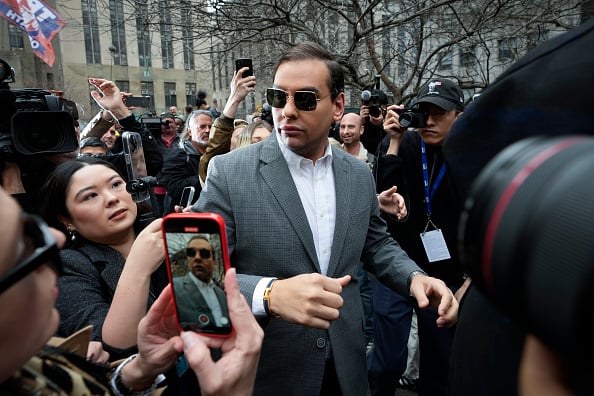The George Santos thing got me to thinking: At what point should a person be disqualified from public office?
Santos, of course, has been accused of a great deal, indicted for less, and convicted of nothing (yet). But the House of Representatives last week voted to expel him.
Sen. Robert Menendez has been accused of a great deal, indicted for about the same amount, and convicted of nothing (yet). But the Senate has not done a thing.
Why?
To challenge myself, I created a series of hypothetical questions to assess how I honestly felt about these issues. I’ll now share these questions with you. Think about each question; decide in your own mind how you’d answer; and then scroll down to see what historical analogue I was thinking of.
Let’s get started:
Should a person be disqualified from public office if they plagiarized a speech?
Yes or no?
Come on; play the game.
I’m obviously thinking of Joe Biden, who plagiarized phrases used by U.K. Labour Party Leader Neil Kinnock in 1988. The public decided this dishonesty should disqualify Biden from public office, and Biden promptly withdrew from the primaries.
That was just a starter question. Let’s get to the meat of my hypotheticals.
Should a person be disqualified from public office if they lied about their academic credentials?
Yes or no?
I’m obviously thinking of Biden, who claimed in 1988 to have graduated in the top half of his law school class, when he actually graduated 76th in a class of 85.
You get the idea. Next question:
Should a person be disqualified from public office if they lied about their academic credentials?
That’s not accidental repetition. It’s a different historical analogue. Should the person be disqualified?
Of course I’m thinking of Santos, who claimed to have graduated from Baruch College, when he had done no such thing.
Should a person be disqualified from public office if they lied about their academic credentials?
No, it’s not triple vision. Who do I have in mind?
Naturally, it’s Donald Trump, who says that he graduated first in his class from the University of Pennsylvania’s Wharton School in 1968. We don’t know Trump’s precise class rank, but the graduation program listed all those who graduated cum laude, magna cum laude, and summa cum laude, and Trump wasn’t in any of those groups, so Trump was far from the top of the class.
Let’s go to some harder questions:
Should a person be disqualified from public office if they are accused of sexual assault?
Remember, it’s just an accusation. What do you think?
Of course I’m thinking of Bill Clinton, famously accused of sexual assault by Paula Jones.
Should a person be disqualified from public office if they are accused of sexual assault?
Again, not double vision. What do you think?
This time, it’s Trump, accused of sexual assault by E. Jean Carroll.
Wait! I phrased the question wrong. I said I would be precise, and I wasn’t. This is what I meant to ask:
Should a person be disqualified from public office if they are found civilly liable for sexual assault?
That’s the actual Carroll situation. I hope I didn’t mess you up by misphrasing the question the first time around.
Let’s do a trickier one:
Should a person be disqualified from being the head of the executive branch of government if they lie under oath, even if the lie is only about sex?
Shoot!
The last phrase gave it away. It’s Bill Clinton, lying about Monica Lewinsky.
This situation gave me pause back in the 1990s. As a litigator, I spent much of my life telling people that they had to tell the truth under oath, sometimes at the cost of their job or marriage. When the chief executive lies under oath, it made my job much harder. I thought that Bill Clinton should have set a better example for America. I would have voted to impeach.
But I digress.
Let me try again:
Should a person be disqualified from being the head of the executive branch of government if they lie under oath, even if the lie is only about sex?
This one’s easy, if repetitive.
It’s Trump and Carroll again, where Trump denied having met or assaulted Carroll, but the civil jury found that he did both. That’s again perjury by the head of the executive branch.
Just six to go:
Should a person be disqualified from public office if they mishandle classified government documents?
This is a tricky one.
It’s Hillary Clinton, who sent documents containing classified material from a personal e-mail server, although none of the documents was marked “Classified” at the top.
Next:
Should a person be disqualified from public office if they mishandle classified government documents?
It’s Mike Pence’s turn in my hypothetical questions.
Again:
Should a person be disqualified from public office if they mishandle classified government documents?
Biden, step right up!
I sure hope you’re getting these questions right.
Third-to-last:
Should a person be disqualified from public office if they mishandle classified government documents?
Of course, it’s now Trump’s turn in the spotlight.
But again, I misphrased the question. I said I’d be precise, and Trump is the only person who’s actually been indicted for mishandling classified government documents. So here’s the right question:
Should a person be disqualified from public office if they are indicted for mishandling classified government documents?
That’s better.
Finally, my last question.
It’s a tricky one. Put on your thinking cap:
Should a person be disqualified from public office if they are indicted on 91 felony charges?
You’re on your own.
Mark Herrmann spent 17 years as a partner at a leading international law firm and is now deputy general counsel at a large international company. He is the author of The Curmudgeon’s Guide to Practicing Law and Drug and Device Product Liability Litigation Strategy (affiliate links). You can reach him by email at inhouse@abovethelaw.com.

